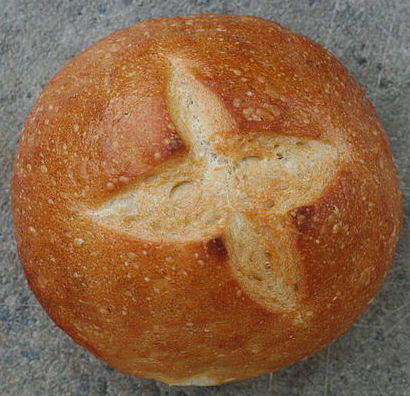John 6:30-33, 48-51
Since the beginning of December I have been making sourdough bread. The last period in my life in which I did that was before our four children became teenagers all at the same time.
I remember now why I love it. It is a meditation. After stirring the ingredients together until the dough is formed, I pour it onto the floury kitchen counter and then knead it, adding flour to my hands and the board until the lump is satin beneath my fingers. Then I keep kneading – for what seems like forever. Inhaling and exhaling as I press and prod, press and prod, I let my thoughts go, and in the rhythm of push and release I enter the present moment. The smell of bread dough fills my nostrils. Beneath my hands a living entity takes shape.
I remember when Rosean was making bread to sell for the Mission. It would rise in a huge, oiled, plastic garbage can, filling the whole thing and sometimes popping the lid loose. Dough grows, breathes and reproduces until it runs out of food or someone takes it in hand.
But for dough to become bread takes a transformation. With one final, heat-induced expansion, it is passed through the furnace. What emerges is a crusty, nutty, steamy nourishment.
In today’s reading from the Gospel of John, Jesus contrasts the manna from heaven that the Israelites received in the desert with himself as bread. They have asked him for a sign and he replies that he himself is the sign they are looking for. “I am the living bread that came down from heaven,” he says. “Whoever eats of this bread will live for ever; and the bread that I will give for the life of the world is my flesh.”
In their Exodus, the Israelites needed God’s bread in order to survive their trek through the desert. God honored God’s covenant with them by providing them, from God’s own hand, with food for their journey. Now God gives them a different kind of food, a food not for the physical body but for the spiritual one. He gives them the Son, who is the Bread of Life. “Eat of me,” Jesus tells them.
The dough of Jesus’ actions, teachings and healings remind us that God loves us and that we ought to love God and one another with the entirety of our hearts, minds and strength. Kneading the dough, we learn and act out of those convictions. But the transformation of that dough is in the furnace of Christ’s passion, death and resurrection. In witness to this transformation we learn at a different level. We come to understand that not only are we of immense value, each by each, to God, but that death itself has no power over us. Death is a chimera. It can not touch our essential nature.
Eating the Bread of Life – the crusty, nutty, steamy nourishment of Christ – brings a profound alteration in our perspective. Because we are loved and because death has no sway over us, we can let go of our need to control, to hoard power and resources, to set our strange little boundaries and to try to protect them at all costs. Without our small self to hold us in, we expand like yeasty dough. We are free. Then, transformed in the furnace of our own passion, we, too, become bread.
Laurie Gudim is a writer and religious iconographer who lives in Fort Collins, CO. You can view some of her work at Everyday Mysteries.
By Jonathunder (Own work) [GFDL 1.2], via Wikimedia Commons

